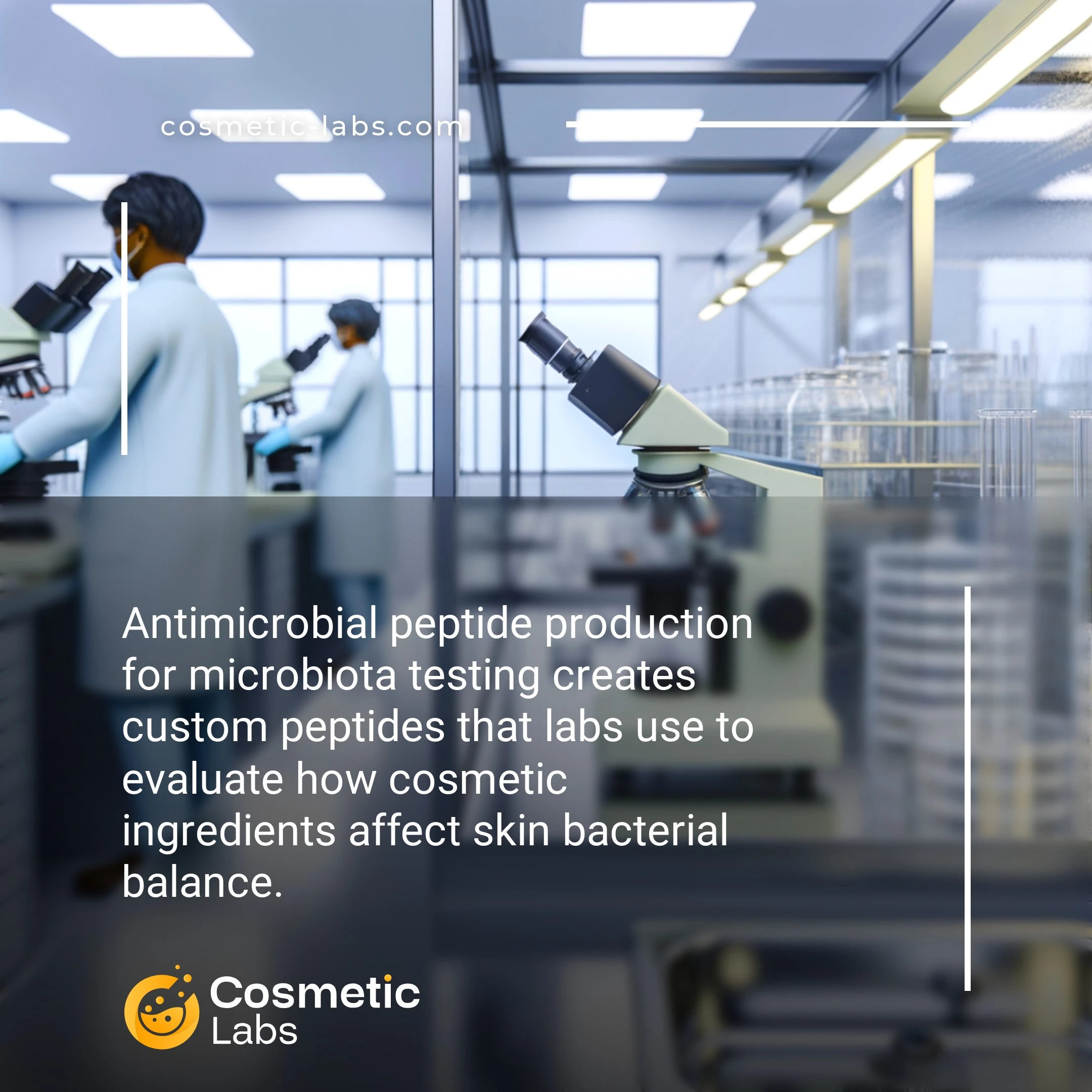Antimicrobial Peptide Production Services for Microbiome Testing

What is Antimicrobial peptides production?
Antimicrobial peptide production for microbiota testing services involves synthesizing targeted peptides that selectively inhibit harmful bacteria while preserving beneficial skin microorganisms. Labs produce these bioactive molecules using recombinant expression systems or solid-phase synthesis, then test their selective antimicrobial activity against specific pathogens like C. acnes or S. aureus. This approach helps beauty brands develop products that maintain healthy skin barrier function without disrupting the natural microbiome balance.
Why do you need this service?
Cosmetic labs use antimicrobial peptide production for microbiota testing to validate probiotic skincare formulations and assess how active ingredients interact with skin bacterial communities. Beauty brands leverage these peptides as positive controls during prebiotic testing, while product developers use them to measure formulation impact on beneficial skin bacteria before market launch.
Who provides Antimicrobial peptides production services?
All cosmetic labs providing Antimicrobial peptides production services
There is no company providing these services at the moment.
Antimicrobial Peptide Production for Microbiota Testing
Cosmetic labs produce antimicrobial peptides as reference standards and positive controls for skin microbiota efficacy testing. These synthesized peptides serve as benchmarks when evaluating how cosmetic formulations affect beneficial skin bacteria populations.
Custom Peptide Synthesis Services
Labs synthesize specific antimicrobial peptides tailored to your testing requirements. Common peptides include defensins, cathelicidins, and histatins that naturally occur in human skin microbiomes.
Production services typically include:
- Solid-phase peptide synthesis with 95%+ purity
- Quality verification through HPLC and mass spectrometry
- Lyophilized powder delivery with stability data
- Custom concentrations from 1mg to 100mg quantities
Turnaround times range from 2-4 weeks depending on peptide complexity and sequence length.
Microbiota Testing Applications
These peptides function as positive controls in bacterial growth inhibition assays and selectivity studies. Labs use them to validate test methods before screening your cosmetic ingredients or finished products.
Testing protocols include:
- Minimum inhibitory concentration (MIC) determination
- Selective antimicrobial activity against pathogenic strains
- Prebiotic effect assessment on beneficial bacteria
Partner labs on our platform combine peptide production with microbiota testing services to streamline your product development timeline. Contact verified laboratories to discuss your specific antimicrobial peptide requirements and testing objectives.
Applications of Antimicrobial Peptide Production for Microbiota Testing
Antimicrobial peptide production for microbiota testing services enables cosmetic brands to validate product safety and efficacy through controlled peptide synthesis and bacterial challenge studies.
Probiotic Cosmetic Formulation Validation
Labs produce specific antimicrobial peptides to test how probiotic skincare formulations respond to pathogenic bacteria. This process involves synthesizing peptides like defensins and cathelicidins that mimic natural skin defense mechanisms. Testing protocols measure minimum inhibitory concentrations (MIC) against Staphylococcus epidermidis and Cutibacterium acnes strains.
Results typically show peptide activity levels within 24-48 hours, providing brands with quantitative data on formulation effectiveness. Labs can adjust peptide concentrations from 10-100 μg/mL to simulate different skin conditions and product applications.
Preservative System Optimization
Antimicrobial peptide production supports preservative efficacy testing by creating standardized bacterial challenges for cosmetic products. Labs synthesize peptides that target specific microorganisms commonly found in beauty products, including Pseudomonas aeruginosa and various yeast strains.
This approach allows brands to reduce traditional preservative concentrations by 20-40% while maintaining product stability. Testing includes time-kill studies and biofilm disruption assays that measure peptide performance over 28-day periods, matching standard cosmetic shelf-life requirements.
| Peptide Type | Target Microorganisms | Testing Duration | Typical MIC Range |
|---|---|---|---|
| Defensins | Gram-positive bacteria | 24-48 hours | 5-25 μg/mL |
| Cathelicidins | Gram-negative bacteria | 48-72 hours | 10-50 μg/mL |
| Histatins | Candida species | 24-96 hours | 15-75 μg/mL |
| Magainins | Mixed bacterial cultures | 48-120 hours | 20-100 μg/mL |
Ready to validate your cosmetic formulations with antimicrobial peptide testing? Contact qualified labs on our platform to discuss your specific microbiota testing requirements and timeline.
